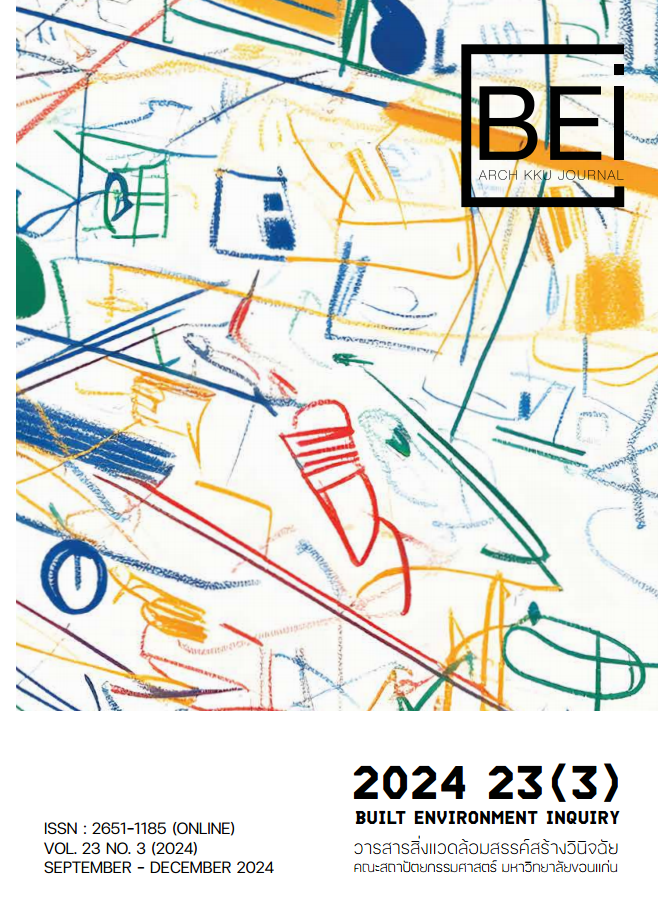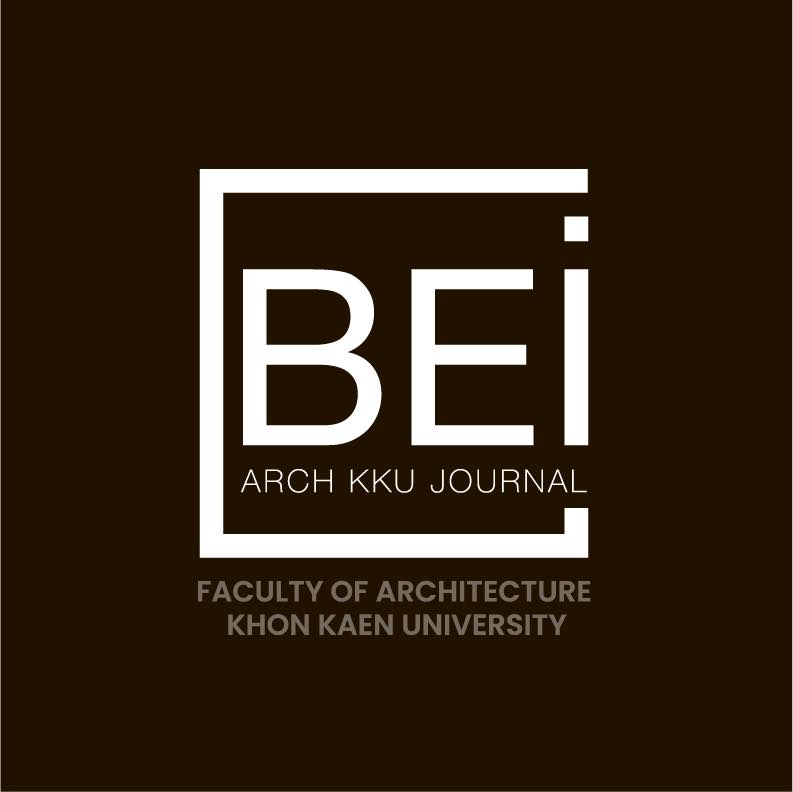The Evolution of Low-Income Housing Policy Paradigms in Thailand
DOI:
https://doi.org/10.14456/bei.2024.28คำสำคัญ:
Low-Income Housing Policy, Policy Paradigms, Supply-Driven, Demand-Drivenบทคัดย่อ
Despite sustained policy interventions, Thailand continues to face significant challenges in providing adequate and affordable housing for low-income communities. The objective of this study is to explore and analyze the paradigms underlying Thai low-income housing policy, an aspect that has been largely underexamined. These paradigms—defined by specific ideas, values, and beliefs—underpin policymaking processes and have influenced policy effectiveness. Through a qualitative analysis of three case studies—Din Daeng Flats, Klong Toei Slum, and Baan Munkong Projects—this research highlights the coexistence of two contrasting paradigms. The National Housing Authority (NHA) adopts a supply-driven, top-down approach, while the Community Organization Development Institute (CODI) emphasizes a demand-driven, participatory model. Findings reveal that this duality has both hindered policy integration and offered flexibility for adaptation. However, the absence of a unified housing policy for low-income groups exacerbates issues such as land disputes, funding shortages, and limited access to housing. Additionally, the rise of a rights-based paradigm driven by NGOs has shown potential for fostering negotiation and community development but faces barriers from entrenched power structures, particularly around land ownership
เอกสารอ้างอิง
Academic Service Center, Faculty of Architecture, Chulalongkorn University. (2009). Overview of Three Decades of Low-Income Housing Development in Thailand. ภาพรวม 3 ทศวรรษ การพัฒนาที่อยู่อาศัยสำหรับผู้มีรายได้น้อยในประเทศไทย. Bangkok: National Housing Authority.
Akin Rapeepat. อคิน รพีพัฒน์. (2003). Patron-client Relationship and Social Development: One Aspect of Societal Transformation in Thailand. ระบบอุปถัมภ์ กับการพัฒนาสังคม ด้านหนึ่งในการเปลี่ยนแปลง. Special Lecture Series Puey Ungphakorn, 9th. Faculty of Economics, Thammasat University. Retrieved from
https://www.econ.tu.ac.th/archive/detail/37
Arrigone, J. L. (1994). Self-help housing and socio-economic development. In dbsa. Development Bank of Southern Africa. Retrieved from https://www.dbsa.org/sites/default/files/media/documents/2023-03/Self-Help%20Housing%20and%20Socio-Economic%20Development%20-1994.pdf
Birch, J. H. (2021). Assessing the changing dynamics of housing policy since 2007: A policy paradigms approach (Dissertation). School for Social Studies, University of Bristol.
Boonlert Visetpricha. บุญเลิศ วิเศษปรีชา. (2019). สิทธิที่จะมีส่วนร่วมในเมือง The Right to the City. CMU Journal of Law and Social Sciences , 12(2). Retrieved from
https://so01.tci-thaijo.org/index.php/CMUJLSS/article/view/213280/159342
Boonlert Visetpricha. บุญเลิศ วิเศษปรีชา. (2020, October 5). Housing Rights: Addressing Ceiling Rights and Human Dignity. สิทธิในที่อยู่อาศัย: ขยับเพดานว่าด้วยสิทธิและศักดิ์ศรีของความเป็นมนุษย์. Retrieved from https://waymagazine.org/and-and-right-housing-10/
Busara Povatong. บุษรา โพวาทอง. (2023). Low-income Housing in Thailand: Concepts, Development Mechanism, and Government Subsidy. ที่อยู่อาศัยเพื่อผู้มีรายได้น้อยในประเทศไทย แนวคิด กลไกการพัฒนา และการอุดหนุนโดยรัฐ (2nd ed.). Bangkok: Chulalongkorn University Press.
Chai – Anan Samudavanija. ชัยอนันต์ สมุทวณิช. (1995). 100 Years of Government Reform: Evolution of State Power and Political Authority 100 ปีแห่งการปฏิรูประบบราชการ: วิวัฒนาการของอำนาจรัฐและอำนาจการเมือง. Bangkok: Institute of Policy Study.
Chattip Nartsupha. ฉัตรทิพย์ นาถสุภา. (1990). The Western Culture and Social Development in Thailand. วัฒนธรรมตะวันตกกับพัฒนาการสังคมไทย. Special Lecture Series Puey Ungphakorn, 3th. Faculty of Economics, Thammasat University. Retrieved from
https://www.econ.tu.ac.th/archive/detail/31
Chiu, H. L. (1984). Four decades of housing policy in Thailand. Habitat International, 8(2), 31–42.
doi: 10.1016/0197-3975(84)90005-5
Chulalongkorn University Academic Service Center. ศูนย์บริการวิชาการแห่งจุฬาลงกรณ์มหาวิทยาลัย. (2011). The Study on The Organization for Housing Development in Thailand. การศึกษาองค์กรเพื่อการพัฒนาที่อยู่อาศัยในประเทศไทย. Bangkok: National Housing Authority.
CODI. สถาบันพัฒนาองค์กรชุมชน. (2013, June 16). Knowing about the Sustainable Housing Project. รู้จักกับโครงการบ้านมั่นคง. Retrieved from
https://ref.codi.or.th/index.php/banmunkong
Dowall, D. E. (1989). Bangkok: A Profile of an Efficiently Performing Housing Market. Urban Studies, 26(3), 327–339.
doi: 10.1080/00420988920080331
Faculty of Social Welfare, Thammasat University. คณะสังคมสงเคราะห์ศาสตร์ มหาวิทยาลัยธรรมศาสตร์. (2514). Report on the important statistical data from the social research survey conducted within the deteriorating waterfront area of Khlong Toei Port, Pra Na Korn Province, along with accompanying photographs. รายงาน ข้อมูลทางสถิติที่สำคัญ ๆ การสำรวจวิจัยทางสังคมสงเคราะห์ บริเวณแหล่งเสื่อมโทรมท่าเรือคลองเตย จังหวัดพระนคร พร้อมด้วยรูปถ่าย. Bangkok: Faculty of Social Administration, Thammasat University.
Hall, P. A. (1993). Policy Paradigms, Social Learning, and the State: The Case of Economic Policymaking in Britain. Comparative Politics, 25(3), 275–296.
doi: 10.2307/422246
Howell, K. (2016). Building empowerment in market-based redevelopment: changing paradigms for affordable housing and community development in Washington, DC. Community Development Journal, 52(4), 573–590.
doi.org/10.1093/cdj/bsv069
Kamath, L. (2012). New Policy Paradigms and Actual Practices in Slum Housing: The Case of Housing Projects in Bengaluru. Economic & Political Weekly. Gale Academic OneFile.
Manop Pongsatat. มานพ พงศทัต. (2539). National Housing Policy. แนวนโยบายที่อยู่อาศัยแห่งชาติ. Personal Research Document National Defense College Program, 8th Generation, Academic Year 1995-1996.
NHA. การเคหะแห่งชาติ. (2024). NHA virtual museum. Retrieved from
http://housingvm.nha.co.th/VM_1.html
Piboon Wattanasiritham. ไพบูลย์ วัฒนศิริธรรม. (2003). Social Administration: The Science of the Century for Thai Society and the Global Community. การบริหารสังคม : ศาสตร์แห่งศตวรรษเพื่อสังคมไทยและสังคมโลก Special Lecture Series Puey Ungphakorn, 3th. Faculty of Economics, Thammasat University. Retrieved from
https://www.econ.tu.ac.th/archive/detail/36
Pornchokchai, S. (2014, February 3). Bangkok Housing Market’s Booms and Busts, What Do We Learn? PRRES 2002, Christchurch, New Zealand. Retrieved from https://www.researchgate.net/publication/228539130_Bangkok_Housing_Market's_Booms_and_Busts_What_Do_We_Learn
Porphan Uiyanon. พอพันธ์ อุยยานนท์. (2021). The Economic History of Thailand. ประวัติศาสตร์เศรษฐกิจแห่งประเทศไทย. Bangkok: Chulalongkorn University Press.
Sheng, Y. K. (2002). Housing, the state and the market in Thailand: Enabling and enriching the private sector. Journal of Housing and the Built Environment, 17(1), 33–47.
doi.org/10.1023/A:1014829310658
Somsuk Boonyabancha. สมสุข บุญญะบัญชา. (2019). BAAN MAN KONG: A housing program which go beyond houses. โครงการบ้านมั่นคง บ้านที่ให้มากกว่าบ้าน. Journal of Social Science and Humanities, 45(1), 1–17. Retrieved from
https://so04.tci-thaijo.org/index.php/socku/article/view/208574
Sopon Pornchockchai. โสภณ พรโชคชัย. (2022, May 13). Demolishing slums in the city center for the benefit of all parties. รื้อสลัมใจกลางเมืองเพื่อประโยชน์ทุกฝ่าย. Retrieved from https://www.bangkokbiznews.com/columnist/1004095
Vacharapol TangkorbLarb. วัชรพล ตั้งกอบลาภ. (2005). An Evolution of Housing Settlement Policies in Klong Toey Community, Bangkok. พัฒนาการของนโยบายแก้ไขปัญหาที่อยู่อาศัยในชุมชนแออัดคลองเตยกรุงเทพมหานคร (Master’s thesis). Department of Architecture (Housing). Chulalongkorn University.
doi: 10.14457/CU.the.2005.748
Viengrat Nethipo. เวียงรัฐ เนติโพธ์. (2024). Patronage Relations under the NCPO Regime: New Networks in an Old Form. ความสัมพันธ์แบบอุปถัมภ์ภายใต้ระบอบคสช.: เครือข่ายใหม่ในรูปแบบที่เก่าแก่กว่า. Retrieved from
https://so08.tci-thaijo.org/index.php/ssjpolsci/article/view/669/484
Wakely, P. (2015). Reflections on urban public housing paradigms, policies, programmes and projects in developing countries. International Journal of Urban Sustainable Development, 8(1), 10–24. doi.org/10.1080/19463138.2015.1055077
Wichaya Komin, Ba-worn Supsingh. วิชยา โกมินทร์, บวร ทรัพย์สิงห์. (2557). Promoting Social Justice: Housing Issues Among Urban Poor. การสร้างความเป็นธรรมทางสังคม เรื่องที่อยู่อาศัยในกลุ่มคนจนเมือง. Social Research Institute, Chulalongkorn University. 57th Annual Academic Conference, Chulalongkorn University. Retrieved from
http://www.cusri.chula.ac.th/backup/download/cluster8.pdf
Wiwat Chaowares. วิวัฒน์ เชาวน์เรศ. (2561). The Pride of the Din Dang Community Urban Renewal Project.ความภาคภูมิใจโครงการฟื้นฟูเมืองชุมชนดินแดง. Bangkok: National Housing Authority.
Zou, Y. (2022). Paradigm shifts in China’s housing policy: Tug-of-war between marketization and state intervention. Land Use Policy, 122(2022).
doi: 10.1016/j.landusepol.2022.106387
Zhu, Y.-P. (2013). Policy Networks and Policy Paradigm Shifts: urban housing policy development in China. Journal of Contemporary China, 22(82), 554–572.
doi: 10.1080/10670564.2013.766380
ดาวน์โหลด
เผยแพร่แล้ว
รูปแบบการอ้างอิง
ฉบับ
ประเภทบทความ
สัญญาอนุญาต
ลิขสิทธิ์ (c) 2024 สิ่งแวดล้อมสรรค์สร้างวินิจฉัย

อนุญาตภายใต้เงื่อนไข Creative Commons Attribution-NonCommercial-NoDerivatives 4.0 International License.
ทัศนะและข้อคิดเห็นของบทความที่ปรากฏในวารสารฉบับนี้เป็นของผู้เขียนแต่ละท่าน ไม่ถือว่าเป็นทัศนะและความรับผิดชอบของกองบรรณาธิการ




